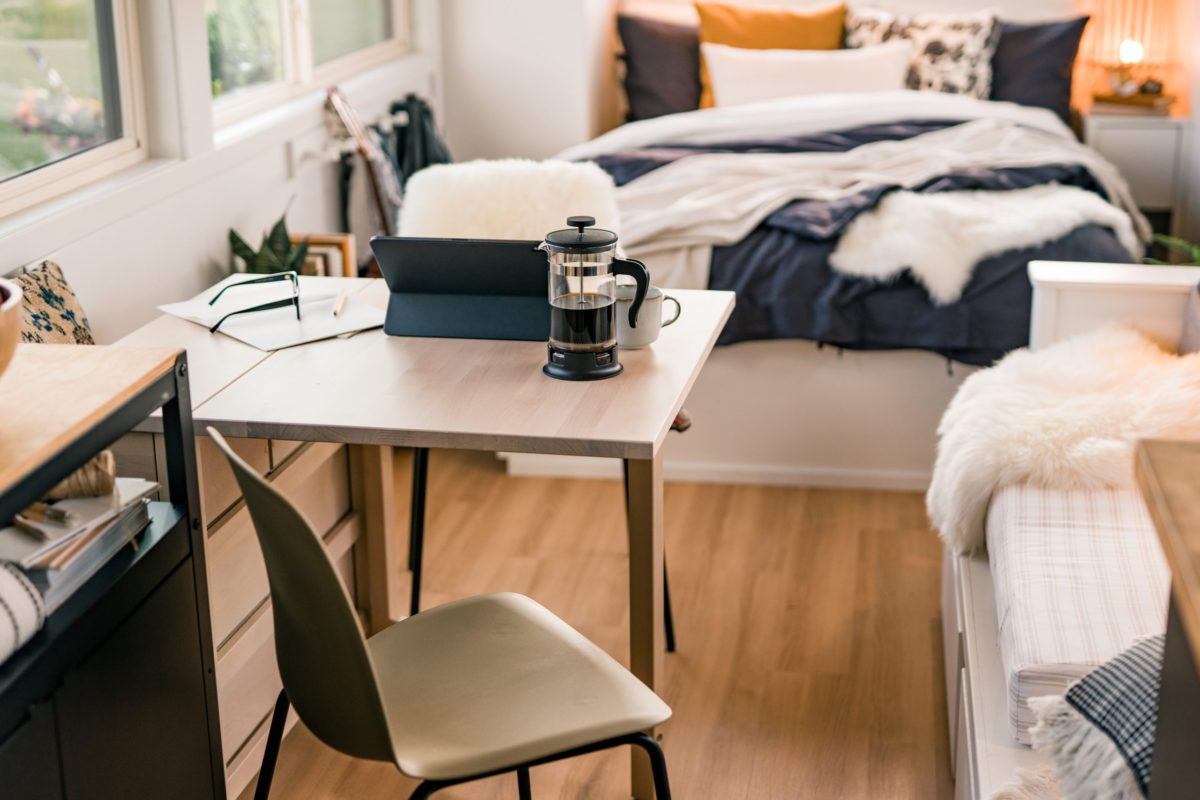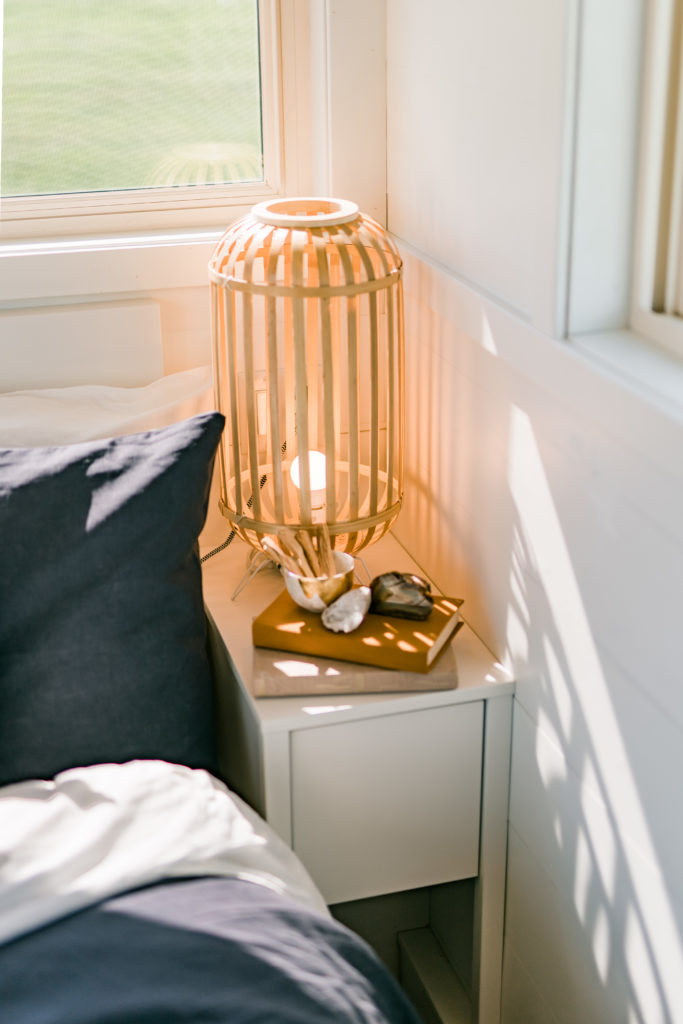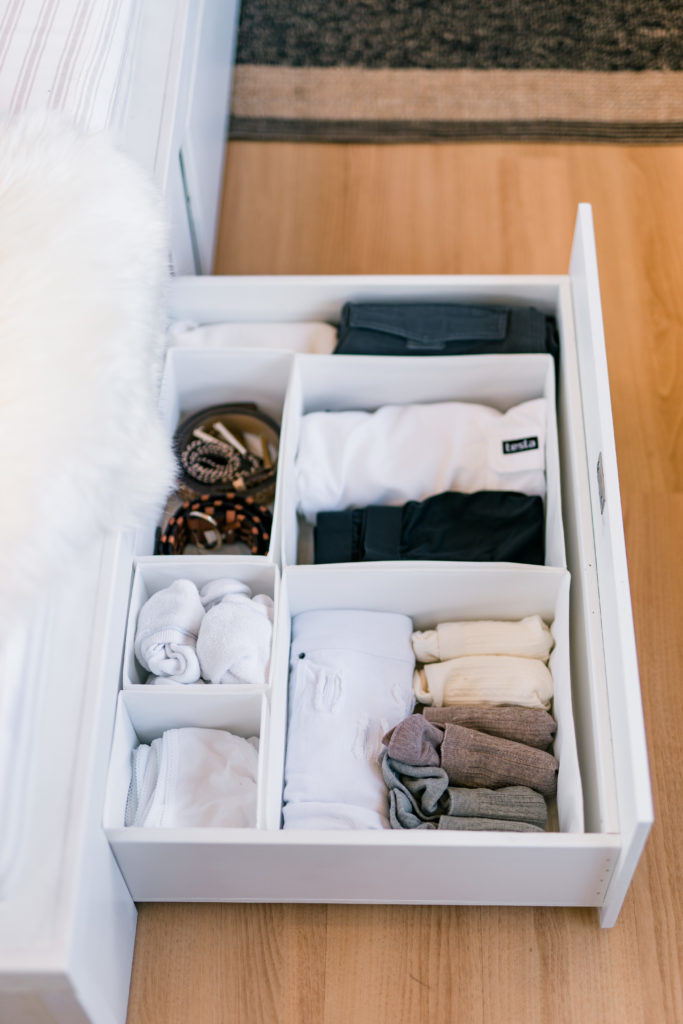
Josiah & Steph Photography
Ikea has finally jumped aboard the tiny-house trend.
This megaretailer of budget-friendly home decor has just unveiled its first tiny house, which measures a mere 187 square feet.

Josiah & Steph Photography
While Ikea created and designed this unit, it isn’t selling it quite yet, as this was just a one-off—a collaboration with Vox Creative and tiny-home builder Escape, meant to showcase how homeowners can create “a small space that can be stylish, affordable and sustainable,” according to Ikea.

ESCAPE RV/Steve Niedorf
Still, if you’re really into the look, the folks at Escape can help you create your own design (for $47,550) using their BOHO XL Wide (shown above) as a starting point.
In keeping with its eco-friendly design, the partners in Ikea’s tiny-house collab strove for all things green, including solar panels and a compostable toilet, as well as interior wall panels made with sustainable pine and kitchen cabinets crafted from recycled bottle tops.

Josiah & Steph Photography
But while minuscule pre-built homes are all the rage of late (Amazon has one for just $36,000), is this type of structure really made for human beings to live in full time?
We reached out to building experts to break down all the construction details entailed in Ikea’s tiny house (and others) so you can fully weigh whether this type of lifestyle is right for you. Just be warned, there are a few huge catches you’ll want to know.
Where will you put your tiny house?
Truth: This isn’t exactly a house—it’s a box on a trailer—and since you can’t ride around in it all the time, you’ll need to park it and do so legally.
“A house usually comes with a tract of land that you also own, so for a tiny home like this one you’re going to have to own or pay rent on a piece of property,” says Tyler Drew, a home builder and CEO of Anubis Properties in Los Angeles.
But if you’re already a homeowner with some backyard real estate, you could use this tiny home setup as a granny pod or for office space, especially since the work-from-home trend is likely to hang on for much of 2021.
How will you tow your tiny house?

Josiah & Steph Photography
As tiny as this home is, you can’t really cart it around with a Mini Cooper or a Prius.
“On top of the cost of this structure, you’re going to need something beefy to tow it to your destinations,” says Drew.
Ready for the math? You’ll have to come up with an extra $50,000 or so for a truck with enough horsepower to tow a tiny house.
If you want to skip the travel portion and live in a permanent spot, this probably isn’t the structure for you.
According to Escape, this tiny home isn’t meant to sit on a foundation, although Drew says you could probably erect a foundation anyway for around $20,000. Still, the cost of this tiny dwelling is adding up fast.
Does this tiny house have enough electricity and hot water?

Josiah & Steph Photography
Although Ikea’s tiny house runs on solar power, “a hot water heater needs a tremendous amount of electrical power that probably can’t be provided by the amount of solar panels pictured here,” Drew points out.
So if you’re hoping for a hot shower along with enough juice for a reading light or morning coffee, you’ll need to outsource this added power. Luckily, Ikea’s tiny house also comes with a simple plug you can insert into a power source for extra juice.

Josiah & Steph Photography
“Trailers like these have a large cable and a hose connector like the ones found on RVs—and most RV parks operate with power and sewer connections so you can hook it up to utilities that way,” says Drew.
Is this tiny house insulated from cold and heat?
Since there’s no foundation here, that means “there’s just four wheels and a jack stand between you and the ground,” says Drew.
And with no buffer from the cement or hard-packed dirt, you’ll definitely struggle to keep this house warm. (Cold air will come right up from below.)
And while the flat roof is great for solar panels, prepare yourself for the heat.
“With all the windows here and what looks to be a metal roof, this thing is going to cook in the summer,” Drew adds.
All in all, Ikea’s first tiny house may be cute, but it’s not as turnkey as you might hope.
“From what I’ve read, the basic price point doesn’t include all the options you might be used to,” says Josh McCormick, vice president of operations at Mr. Electric. “Count on spending upward of $19,000 for a washer-dryer combo, a bigger bathroom, and an upgraded fridge and range.”
Will you have enough room for all your stuff?

Josiah & Steph Photography
It also goes without saying that in this tiny house or others, you’ll need to shed most of your belongings.
The kitchen has room for a small set of dishes, a couple of pots, and just a few forks and knives, while the bedroom area offers about the same space for clothing that you had in your summer camp trunk as a kid.

Josiah & Steph Photography
That said, you have to hand it to Ikea—it’s got the hygge look down pat. With casually draped sheepskins and blond wood details, you can see yourself nestled here for weeks working on your novel, with scented candles and a steaming cup of tea nearby.
Should you buy an Ikea-style tiny house?
Frankly, Drew and other construction experts think that owning a manufactured home or a one-bedroom condo would be a whole lot easier than Ikea’s tiny house, and probably end up costing about the same price.
In many places in the U.S., “There are brick and mortar houses for sale for under $47,000, and most are quite livable,” says Drew.
Plus, you’ll need cash upfront to secure this tiny home.
“No one is going to lend you money for a home that can up and move at a moment’s notice,” says Drew.
In other words, wherever you buy a tiny house—from Ikea or otherwise—make sure to do the math, and you might realize that living here might require a bigger pile of cash than you’d ever imagined.
The post Inside Ikea’s First Tiny House—and a Few Huge Catches Under the Hood appeared first on Real Estate News & Insights | realtor.com®.
source https://www.realtor.com/news/trends/inside-ikeas-first-tiny-house-and-a-few-catches-under-the-hood/
No comments:
Post a Comment